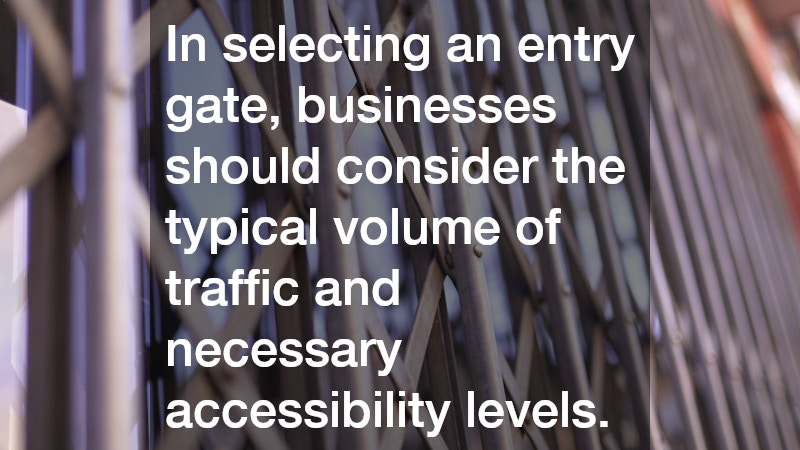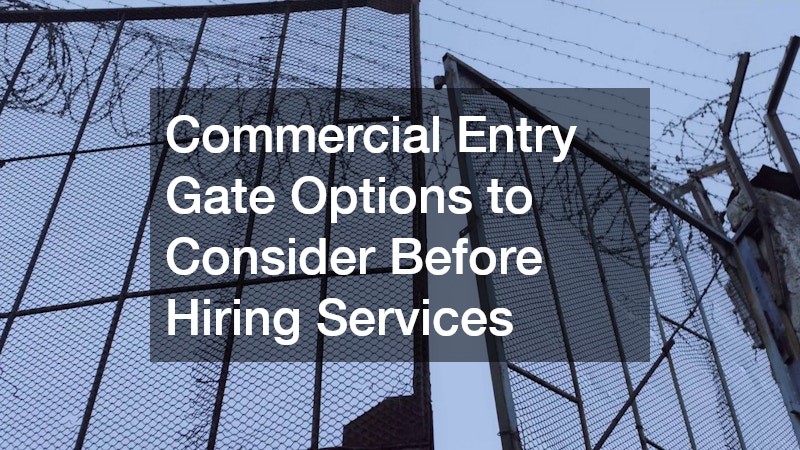Choosing the right commercial entry gate is a crucial decision for businesses, as it significantly impacts the security, aesthetics, and accessibility of the premises. A well-selected gate enhances property security while contributing positively to the overall business environment. Understanding the importance of entry gate selection, businesses must explore various options and concerns before hiring gate services.
Evaluating these factors ensures that the chosen solution aligns with both immediate needs and long-term goals. This article delves into different types of commercial entry gates, offering insights into making an informed choice.
What Are the Types of Commercial Entry Gates Available?
Automatic vs. Manual Entry Gates
Automatic entry gates offer convenience and enhanced security features, as they can be operated remotely and often include advanced access control systems. However, they may require a more significant upfront investment and ongoing maintenance. On the other hand, manual gates are typically less expensive initially and can be easier to maintain due to fewer mechanical components. They often require more manual labor and may not provide the same level of security as automatic options. When deciding between automatic and manual gates, businesses should consider the balance between convenience and budget constraints. Additionally, the level of control and security offered by each type should align with the business’s specific requirements.
Materials Used in Entry Gate Construction
The choice of material for commercial entry gates plays a vital role in determining durability, maintenance needs, and cost. Steel gates are renowned for their robustness and strength, making them ideal for high-security needs, although they may require periodic maintenance to prevent rust. Aluminum gates offer a lightweight alternative with low maintenance needs and corrosion resistance, though they may be less durable in high-impact situations. Wooden gates provide a traditional, aesthetic appeal and can be customized to fit the business’s design preferences, yet they generally demand more maintenance to protect against the weather. Businesses must weigh the pros and cons of each material, considering their specific needs and environmental factors.
How to Determine the Best Entry Gate for My Business?
Assessing Security Needs
Businesses must start by evaluating their security priorities to select an entry gate that offers adequate protection. Factors such as location, threat level, and the value of assets on the premises will guide this assessment. Thoroughly understanding these needs, businesses can choose features like reinforced materials, advanced locking systems, or surveillance integration for the entry gate. This ensures optimal security without compromising on other essential aspects like operational efficiency. Consulting with security experts can provide deeper insights into the specific risks and ideal gate options for a business.
Understanding Traffic Flow and Accessibility
In selecting an entry gate, businesses should consider the typical volume of traffic and necessary accessibility levels. High-traffic areas may benefit more from automatic gates to facilitate swift entry and exit, minimizing delays. Conversely, facilities with limited access requirements might favor manual gates, focusing on simplicity and cost-effectiveness. Businesses should also consider accessibility for all users, ensuring gate operations do not hinder those with disabilities. Thoughtfully evaluating these factors contributes to a choice that supports smooth operations.
What Are the Key Features to Look for in Entry Gate Services?
Installation and Customization Options
Various installation and customization options are available from entry gate service providers, allowing businesses to tailor the solutions to their precise needs. Customization might include specific colors, logos, or integration with existing security systems. The installation process needs careful planning to ensure minimal disruption to business operations and adherence to safety standards. Professional services ensure efficient installation while addressing potential challenges. The flexibility offered through custom features can align the entry gate with the business’s brand identity and functionality goals.
Maintenance and Support Services
Ongoing maintenance and support are essential aspects that businesses should consider when choosing entry gate providers. Regular maintenance ensures the gate’s continued functionality and prevents potential security breaches or operational downtime. Providers offering comprehensive support including emergency repair services can minimize disruption in case of unexpected issues. This support is vital for maintaining high security levels and smooth operations. Businesses should evaluate service contracts to understand the scope and responsiveness of the support offered.
How Does Cost Influence the Choice of Entry Gate?
Initial Installation Costs
The initial installation costs of commercial entry gates are influenced by various factors, such as the type of gate, materials chosen, and the complexity of installation. Businesses need to consider these upfront costs against their budget constraints and priorities. For instance, automatic gates might involve higher initial costs due to the sophistication of the technology involved. Despite the cost, they provide features that may justify the investment over time. It is crucial to balance immediate financial resources with long-term strategic benefits in selecting an entry gate.
In conclusion, selecting the right commercial entry gate demands a comprehensive understanding of various options and the services that install and maintain them. By evaluating factors such as gate type, material, security, and costs, businesses can make informed decisions that enhance security and operational efficiency. A thorough analysis of specific needs, combined with a consideration of long-term goals, ensures a choice that aligns with a business’s vision. This careful selection process not only supports immediate operational needs but also promotes sustainable business security and success.

